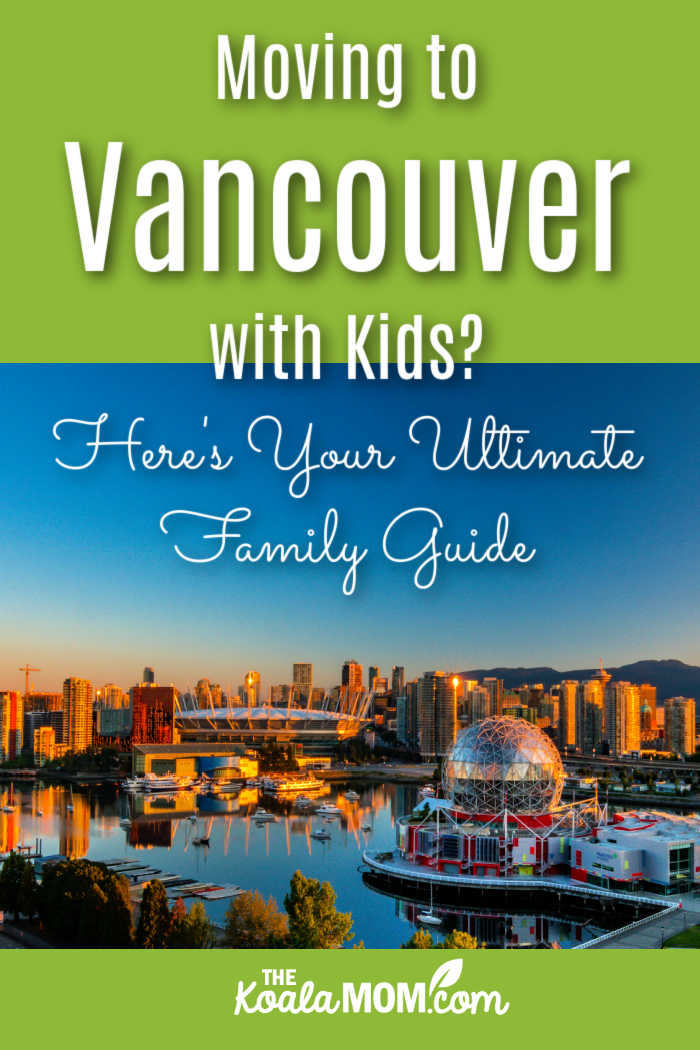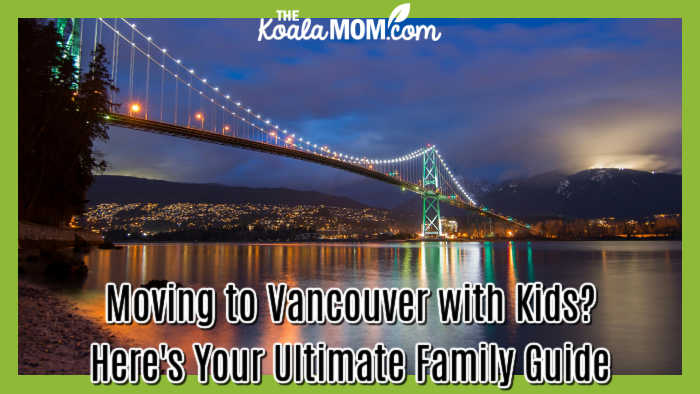Moving to a new city is a huge adventure at any stage of life. When you’ve got little ones, it feels like the adventure doubles! Vancouver, British Columbia, with its breathtaking mountains, sparkling ocean, and a vibe that just screams “family-friendly,” is a dream destination for many (including my own family). If you’re considering a move here from anywhere in the world, this guide will walk your family through the journey, offering practical tips and a warm embrace to help you settle in and truly thrive.

Plan Your Family’s Big Move to Vancouver
A smooth move to Vancouver starts long before the boxes are packed. Think of it as creating a gentle landing for your family, minimizing stress and making sure everyone feels excited and supported. Getting organized can turn a daunting move into a series of manageable steps.
Begin your process by dreaming about neighborhoods, getting quotes from movers, and setting a budget for your transition to your new home. If you’re coming from another country, look into visa requirements and any other international move requirements. If you don’t already have a job lined up, add job hunting to your to-do list.
If you already know anyone in Vancouver, connect with them about your big dream. You can also look for local communities on Facebook and other social media sites. For example, as a Catholic homeschooling mom, I’ve often plugged into local homeschooling and Catholic communities after we’ve moved. Making some new friends before your move can really help with building relationships once you get here.
As day of your move gets closer, it’s time to finalize your new home rental or purchase, book your movers (or a rental truck), and start decluttering. Think of decluttering as a fresh start; it saves money on moving and helps you feel lighter in your new space. If your new home is very different than your previous home, furniture and other items that worked before may not fit the new space. As moving is expensive, it may be cheaper to donate or sell items before your move and replace them when you arrive in Vancouver.
In the final few weeks, remember to update your address everywhere important, arrange for utilities in your new Vancouver home, and get those last boxes packed. Don’t forget an “essentials box” with everything you’ll need right away, like toothbrushes and a favorite toy. This step-by-step approach helps ease everyone’s worries, letting you focus on your children’s excitement rather than just the logistics.
Choosing the Right Moving Partner
Picking the right moving company can make all the difference. Professional Vancouver movers understand Vancouver’s unique quirks, like steep hills and busy streets, and needing to book elevators in apartment buildings. They also come prepared for our famous rainy weather, ensuring your precious belongings stay dry and safe.
Packing doesn’t have to be a chore; it can be a fun way to involve your kids and help them feel part of the big change! Encourage older children to decorate boxes or create secret codes for labels, turning it into a game. Even toddlers can help by coloring on boxes or, during unpacking, by putting small, unbreakable items in their new spots. For example, my younger kids often packed their own toys and books during our moves. This hands-on involvement helps them process the move positively, giving them a sense of control amidst the newness.
Essential Steps for Settling Your Family in Vancouver
Once the boxes are in, there are a few key administrative steps to truly make British Columbia feel like home.
Navigating Healthcare: BC’s Medical Services Plan (MSP)
Your family’s health is paramount, so understanding BC’s healthcare system is crucial. All eligible residents, including international students staying six months or more, need to enroll in the BC Medical Services Plan (MSP) when they arrive. You should apply as soon as you arrive, but your coverage may not begin until three months after your move-in date.
Finding a Family Doctor
Finding a family doctor can take a bit of time, so it’s best to start your search early. You can register with the Health Connect Registry, ask new friends for recommendations, or check online directories. While you wait for a family doctor, ensure you know where your closest walk-in clinics are and how to access them. If no doctors in your area are currently taking new patients, you can also look for a nurse practitioner.
SIN, Banking, and Utilities
Beyond healthcare, a few other foundational steps will help you get settled. If you’re new to Canada, you’ll need to apply for a Social Insurance Number (SIN) for everyone in your family; it’s essential for work and accessing government services. Children aged 12 and up can apply for their own.
If you’re moving from outside Canada, setting up bank accounts is another priority; many Canadian banks offer special packages for newcomers. Don’t forget phone and internet service providers. It’s worth comparing online plans to get the best rate. These days, with the elimination of long-distance fees, many people keep their cell phone number after a move. For example, my brother got his first cell phone in Nova Scotia when he lived on the military base there, and has kept that phone number through several postings in western Canada.
Also, remember to update your address with federal and provincial services and arrange for electricity with BC Hydro. You’ll also need to get familiar with Vancouver’s waste collection and recycling, as this varies in each municipality.
You’ll also want to have Canada Post forward your mail, which can be done online for a period of 6 months or 1 year.
Driver’s Licenses and Vehicle Registration
If driving is part of your Vancouver plan, you’ll need to transfer your driver’s license and register your vehicle with the Insurance Corporation of British Columbia (ICBC) within 90 days of arriving. ICBC is the only vehicle insurance provider in BC.
Education and Childcare
For parents, understanding schools and childcare is often at the top of the list when moving to a new city. Vancouver offers both public and private school choices, each with its own enrollment process.
Public School Enrollment (Vancouver School Board)
The Vancouver School Board (VSB) uses an online application plus in-person document check for Grades 1–12. Kindergarten priority registration runs Nov 1–Jan 31 (newcomers apply via the Newcomer Welcome Centre). You’ll need BC residency proof, your child’s birth certificate, immigration papers, and immunization records. Be prepared for catchment draws or cross-boundary transfers in February.
Exploring Private School Options
Vancouver also has a variety of independent private schools, each with different educational philosophies. Independent schools like Mulgrave (IB), St. George’s (boys), York House (girls), and Fraser Academy (dyslexia support) each set competitive deadlines and unique curricula, so research your top picks early and note their individual timelines. There are also numerous options for homeschooling your children in BC.
Securing Childcare in Vancouver
Licensed spots are managed by non-profits and community centres, starting with the Westcoast Child Care Resource Centre for referrals. With wait list fees eliminated as of April 1, 2024, and subsidies targeting daily rates near $18, you can apply broadly without extra costs.
Embracing Family Life: Costs, Transit, and Fun
Understanding the practicalities of daily life, from budgeting to getting around and finding fun activities, is key to truly settling into Vancouver.
Vancouver is known for its higher cost of living, especially when it comes to housing. A family of four, excluding rent, might expect monthly costs around CAD 4,100, with three-bedroom apartments renting for CAD 3,800–5,000; home prices average $1.9 M (detached), $760 K (condos), and $1.15 M (townhouses). Many families consider condos or nearby suburbs to balance budget and space. Other families, including my own, have come up with creative options like triple bunkbeds to make small spaces work. You can also try to wait-list for low income housing or housing co-operatives.
Navigating Vancouver with Kids: TransLink Public Transit
Vancouver’s public transit system, TransLink, is a fantastic way to explore the city with your family. A huge bonus: children aged 12 and under ride free on all TransLink services, including buses, SkyTrain, and SeaBus! Adults and teens use Compass cards or contactless payment with 90-minute transfers. The TransLink Trip Planner makes it easy to map family-friendly routes. In many parts of the city, children ride public transit to get to school everyday.
Family Adventures: Activities and Community Resources
Vancouver is bursting with opportunities for family fun and connection!
Recreational Activities & Attractions
The City of Vancouver offers a huge range of activities through its 24 community centers, pools, ice rinks, and fitness centers. You’ll find everything from sports and fitness to arts and educational programs for all ages, often with passes and discounts available. Beyond these, popular family spots include Science World, the Vancouver Aquarium, Granville Island, and the iconic Stanley Park, which is a wonderland of forests, views, and playgrounds. There’s always something to do, keeping your family active and engaged year-round.
Public Library Programs
The Vancouver Public Library (VPL) is a true gem for families, offering free, engaging programs at its many branches. Think lively Family Storytime, Toddler Storytime, and Babytime sessions, perfect for fostering a love of reading and connecting with other families. These programs are a wonderful way to build community and support early childhood development. Many libraries also offer study and play spaces and additional family-friendly items, such as telescopes or frisbee golf sets, for loan.
Family Support Programs
Vancouver provides strong community resources to support families through various stages. Organizations like the YWCA offer valuable programs, including parenting workshops (like “Nobody’s Perfect” and “My Tween and Me”), support groups for single mothers, and even culturally specific programs like “My New Home for Latin Moms.” Vancouver Coastal Health provides family support services focusing on mental wellness. These programs offer crucial social and emotional support, helping new families build connections and navigate any challenges as they settle in.

Welcome Home, Vancouver Families!
Moving to Vancouver with your children is a big step, but it’s one that promises a truly enriching and vibrant family life. From carefully planning your move and navigating essential administrative steps to finding the perfect neighborhood, accessing quality education and childcare, and discovering endless recreational opportunities, Vancouver truly embraces families.
The city’s commitment to public services, like free transit for kids and more affordable childcare, makes it even more welcoming despite the higher cost of living. With this guide, and your proactive spirit, your family is well-equipped to embark on this exciting new chapter.
Welcome to Vancouver—your ultimate family adventure awaits!

No Responses Yet